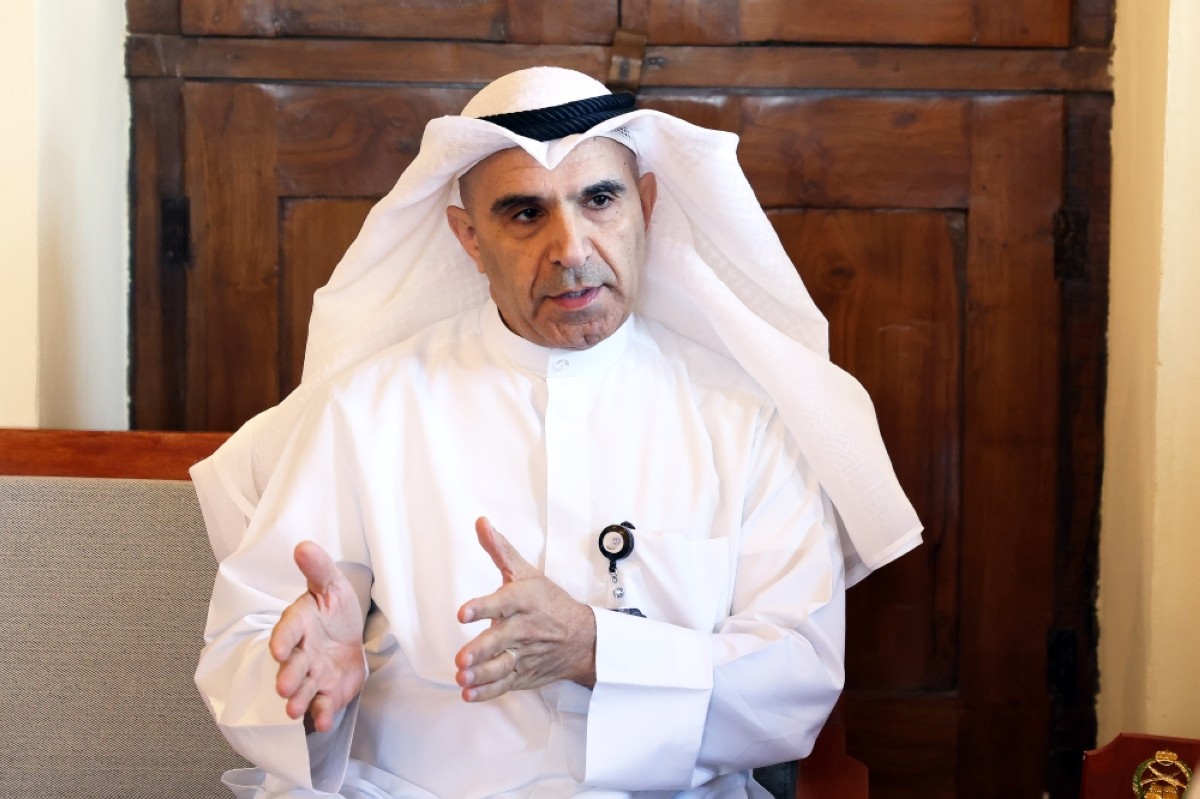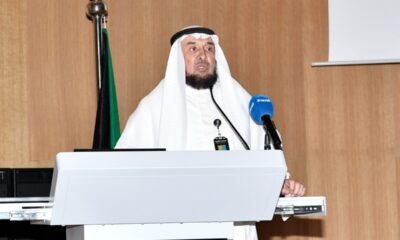KUWAIT: Today’s diplomat serves not only as the face of their country abroad but also as a cultural ambassador and a vital bridge-builder between societies and governments. This is where the role of diplomatic institutes becomes essential. Speaking to Kuwait Times, Ambassador Nasser Sabeeh AlSabeeh, Assistant Foreign Minister for Saud Nasser Al-Sabah Diplomatic Institute, highlighted the Institute’s role in providing up-to-date training programs to equip diplomats to handle issues with skill and efficiency.
Kuwait Times: What role does the Saud Nasser Al-Sabah Diplomatic Institute play in training and qualifying Kuwaiti diplomats?
Ambassador AlSabeeh: As established by its founding decree, the Institute is responsible for enhancing the capacities and skills of diplomatic and administrative staff at the Ministry of Foreign Affairs and personnel from other state institutions. We offer a wide range of training programs covering multiple professions, such as engineering, information technology, political science, protocol, economics, report writing, and community engagement. We coordinate overseas training sessions in Arab and European countries that offer rare expertise to sharpen our diplomats’ skills. We send the selected diplomats abroad for these courses, which are fully sponsored by the Institute.
Ambassador Nasser Sabeeh Al-Sabeeh, Assistant Foreign Minister for Saud Nasser Al-Sabah Diplomatic Institute speaks to Kuwait Times.
Photos by Yasser Al-zayyat
Saud Nasser Al-Sabah Diplomatic Institute
Kuwait Times: How does the Institute balance the preservation of traditional diplomatic principles with keeping pace with the rapid global changes?
AlSabeeh: We remain committed to the core principles of Kuwaiti foreign policy, which emphasize dialogue and positive neutrality. In light of the rapid global shifts, we employ modern training tools such as virtual meetings and offer online courses. We are also currently working on establishing a digital library that will archive training courses for future reference.
Kuwait Times: What role does artificial intelligence (AI) play in the Institute’s programs?
AlSabeeh: We are gradually integrating AI, beginning with awareness initiatives and then evaluating how trainees utilize it. Our aim isn’t merely educational, where we assess whether the use of AI tools is superficial or if it’s enhancing their understanding. AI is not a replacement for effort; it is a supportive tool for development.
Kuwait Times: How do you see AI affecting the future of diplomatic work?
AlSabeeh: AI will become an integral part of our training programs. We consider it a broad enabler for the future and ensure it’s embedded in our programs, such as the “Tomouh” (Ambition) program for new ministry recruits and the “Reyada” (Leadership) program for promoted diplomats.
Kuwait Times: How does the Institute assess the impact of its programs on the performance of diplomatic missions abroad?
AlSabeeh: Our programs provide ministry personnel with knowledge and skills during their service in Kuwait. When transferred abroad, we offer them a tailored program called “Tamkeen” (Empowerment), which covers protocol, duties, rights, and their roles in the host country.
Kuwait Times: How important is language proficiency in preparing diplomats?
AlSabeeh: English proficiency is a basic requirement for overseas assignments. The Ministry also provides foreign language training for diplomat and their spouse for one year in the host country to facilitate integration and effective communication. The government offers full support for learning key local languages such as French, Russian, or Chinese.
Kuwait Times: You previously mentioned training programs in Kuwait for foreign diplomats. How important is integrating local cultural understanding in shaping a diplomat?
AlSabeeh: We approach the diplomatic community in Kuwait with what we call a “Kuwaiti flavor.” We don’t necessarily immerse them deeply in cultural details, but we offer a light introduction that helps them understand the local society. Our aim is always to bridge gaps and foster intersections and mutual understanding between cultural heritages without clashes. We create genuine integration opportunities through Ramadan events, lectures, and joint activities that receive enthusiastic engagement from both Kuwaiti and foreign diplomats. We also offer them Arabic language courses. There is a great demand for it, we have also provided training courses on the Kuwaiti dialect to offer greater understanding of the local dialect for the ambassadors.
Kuwait Times: How important is psychological well-being in diplomat training programs?
AlSabeeh: Mental health is fundamental. The better a diplomat’s psychological state, the more effective their performance. We don’t neglect this aspect; rather, we work to support and strengthen it. A diplomat facing psychological challenges cannot effectively represent their country, so personal balance and self-care are essential parts of our training approach.
Kuwait Times: Are there actual joint programs with international partners under the Institute’s initiatives?
AlSabeeh: Yes. We launched the “Hosting” Program, which allows us to receive foreign delegations based on their specific training needs. Sometimes, the request comes from a foreign country; other times, we propose it. We then coordinate a balanced training program depending on their preferences and what we have to offer. This program is ongoing and expanding. Through it, we aim to build training partnerships based on mutual respect and understanding.
For example, we hosted a diplomatic delegation from the Netherlands. They were surprised by our interest in renewable energy, as they didn’t expect an oil-rich country like Kuwait to have such initiatives. We took them to the Kuwait Institute for Scientific Research and then to a desert site to observe a wind and solar energy project. This hands-on experience gave them a real view of Kuwait’s efforts and made a strong impression, especially as it condensed complex information into a single day of practical exposure.
Kuwait Times: What are the Institute’s plans to expand its training and specialization programs? Is there a vision for the Institute to become a regional or international consultancy entity?
AlSabeeh: Consultancy work cannot be one-sided—it requires interest and outreach from external parties. However, we are members of the International Forum on Diplomatic Training (IFDT), which includes institutes from around the world. Through it, we participate in annual workshops and training sessions, exploring how to merge cultures, exchange experiences, and develop training tools aligned with international standards.
At the Institute, there’s always room for improvement and development. Success isn’t tied to timing alone, but also to how well ideas align with the target audience and participant engagement. Sometimes we prefer smaller groups to ensure rich interaction and dialogue. We don’t measure our success by the number of sessions held. Our goal isn’t to say, “We held 10 courses this year instead of 5 last year.”
Our real ambition is to say that there has been a qualitative development in our outcomes. Therefore, we make sure to hold a public lecture or seminar at least once a month. Over time, we’ve elevated the level of our invitations, now hosting international figures such as the Secretary General of the Arab League, the Gulf Cooperation Council, and some high-level officials from the United Nations. This attracts a high-caliber, specialized audience and adds real diplomatic and intellectual value to the Institute.


















